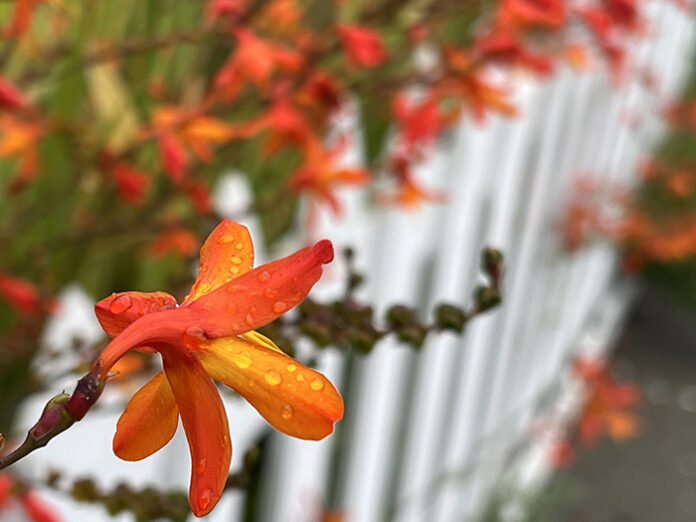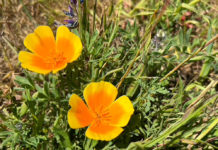Ahhhhh. The sweet smell of petrichor last week was a welcome joy. Petrichor? Yes, petrichor: the pleasant, earthy odor that follows gentle rain after a dry spell. Cool word, isn’t it? Pictured above are a few drops highlighting the Crocosmia crocosmilflora, or Coppertips Montbretia. These flowers, in the Iris family, are native to France and symbolize adaptability and enthusiasm—watch words for the week.
Fun facts: English is often thought to have more words than other languages, allowing its users nuances of meaning like in the word “petrichor.” However, counting words in different languages is tricky business. There are reportedly 6,909 distinct languages, and they each operate differently. For instance, German allows compound words. A high Alpen brook trout is a ‘Hochgebirgsbachforelle.’ A Danube ship captain: Donaudampfschifffahrtsgesell-schaftskapitän. However, the newish German law governing spelling, the Rechtschreibereformgesetz, may not allow three consecutive “f”s—it’s difficult to know. Finnish is agglutinative, whereby prefixes and suffixes are allowed on any word. With combinative possibilities, German and Finnish easily surpass English in word count. Rules allow people to, literally, make up words. Korean has more than 1 million words. In Korean, a dialect’s different words count separately. So, dialects act as word-count multipliers. Korean word count compares to 1,022,000 or 171,476 English words—depending on who’s counting. The latter is Oxford Dictionary’s words in use, 600,000 if historical words are included; the former count is from Google digitization in 2010. French, with an estimated 100,000 words, is often called the world’s most beautiful language. Some think this stems from French being a diplomatic language, evolving gentle terminology for dicey situations. A middle-aged woman is “une femme d’un certain age”; “entre dans la lune” is to pay zero attention. French is decidedly idiomatic; in fact, idioms are “expressions Françaises.” Italian is also called the world’s most beautiful language, perhaps for its mellifluous sound and poet Dante Alighieri’s role in fathering Italy’s mother tongue. Italian is estimated to have 260,000 words. I like MPoppins’ word: supercalifragilisticexpialidocious, with 34 letters—I use it when I have nothing to say.










